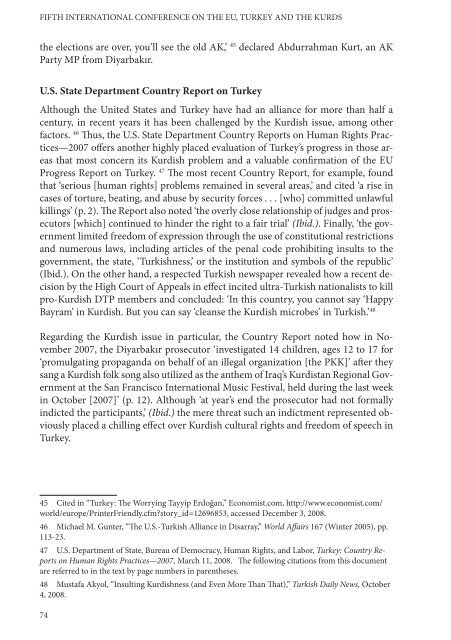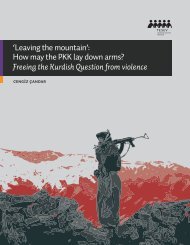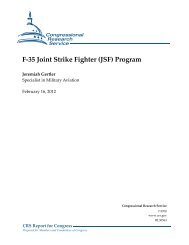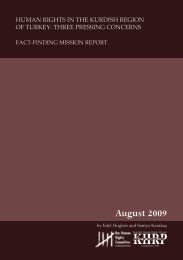FIFTH INTERNATIONAL CONFERENCE ON THE EU TURKEY AND THE KURDS
fifth international conference on the eu, turkey and the kurds
fifth international conference on the eu, turkey and the kurds
You also want an ePaper? Increase the reach of your titles
YUMPU automatically turns print PDFs into web optimized ePapers that Google loves.
<strong>FIFTH</strong> <strong>INTERNATI<strong>ON</strong>AL</strong> <strong>C<strong>ON</strong>FERENCE</strong> <strong>ON</strong> <strong>THE</strong> <strong>EU</strong>, <strong>TURKEY</strong> <strong>AND</strong> <strong>THE</strong> <strong>KURDS</strong><br />
the elections are over, you’ll see the old AK,’ 45 declared Abdurrahman Kurt, an AK<br />
Party MP from Diyarbakır.<br />
U.S. State Department Country Report on Turkey<br />
Although the United States and Turkey have had an alliance for more than half a<br />
century, in recent years it has been challenged by the Kurdish issue, among other<br />
factors. 46 Thus, the U.S. State Department Country Reports on Human Rights Practices—2007<br />
offers another highly placed evaluation of Turkey’s progress in those areas<br />
that most concern its Kurdish problem and a valuable confirmation of the <strong>EU</strong><br />
Progress Report on Turkey. 47 The most recent Country Report, for example, found<br />
that ‘serious [human rights] problems remained in several areas,’ and cited ‘a rise in<br />
cases of torture, beating, and abuse by security forces . . . [who] committed unlawful<br />
killings’ (p. 2). The Report also noted ‘the overly close relationship of judges and prosecutors<br />
[which] continued to hinder the right to a fair trial’ (Ibid.). Finally, ‘the government<br />
limited freedom of expression through the use of constitutional restrictions<br />
and numerous laws, including articles of the penal code prohibiting insults to the<br />
government, the state, ‘Turkishness,’ or the institution and symbols of the republic’<br />
(Ibid.). On the other hand, a respected Turkish newspaper revealed how a recent decision<br />
by the High Court of Appeals in effect incited ultra-Turkish nationalists to kill<br />
pro-Kurdish DTP members and concluded: ‘In this country, you cannot say ‘Happy<br />
Bayram’ in Kurdish. But you can say ‘cleanse the Kurdish microbes’ in Turkish.’ 48<br />
Regarding the Kurdish issue in particular, the Country Report noted how in November<br />
2007, the Diyarbakır prosecutor ‘investigated 14 children, ages 12 to 17 for<br />
‘promulgating propaganda on behalf of an illegal organization [the PKK]’ after they<br />
sang a Kurdish folk song also utilized as the anthem of Iraq’s Kurdistan Regional Government<br />
at the San Francisco International Music Festival, held during the last week<br />
in October [2007]’ (p. 12). Although ‘at year’s end the prosecutor had not formally<br />
indicted the participants,’ (Ibid.) the mere threat such an indictment represented obviously<br />
placed a chilling effect over Kurdish cultural rights and freedom of speech in<br />
Turkey.<br />
45 Cited in “Turkey: The Worrying Tayyip Erdoğan,” Economist.com, http://www.economist.com/<br />
world/europe/PrinterFriendly.cfm?story_id=12696853, accessed December 3, 2008.<br />
46 Michael M. Gunter, “The U.S.-Turkish Alliance in Disarray,” World Affairs 167 (Winter 2005), pp.<br />
113-23.<br />
47 U.S. Department of State, Bureau of Democracy, Human Rights, and Labor, Turkey: Country Reports<br />
on Human Rights Practices—2007, March 11, 2008. The following citations from this document<br />
are referred to in the text by page numbers in parentheses.<br />
48 Mustafa Akyol, “Insulting Kurdishness (and Even More Than That),” Turkish Daily News, October<br />
4, 2008.<br />
74





